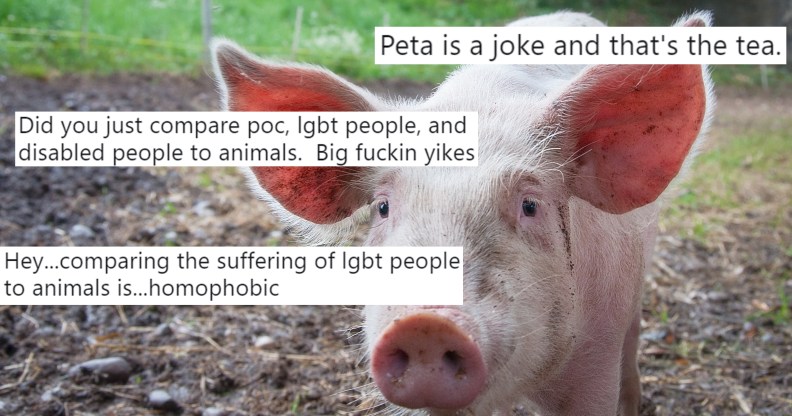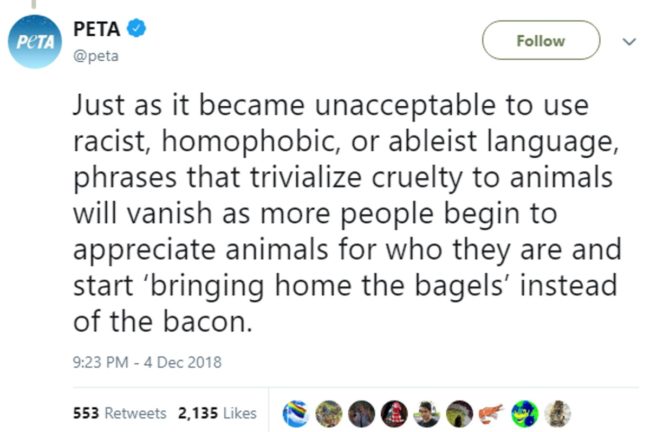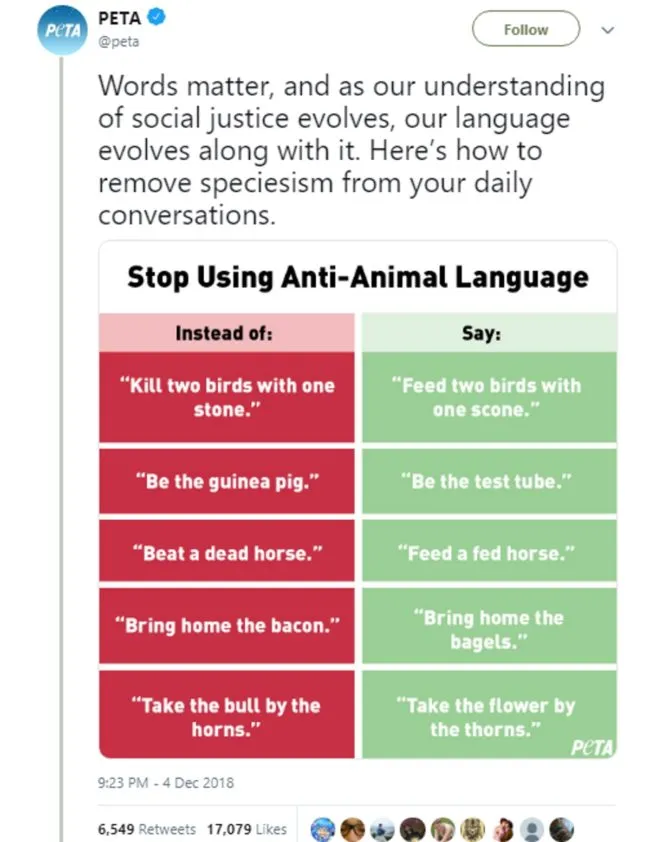PETA compares homophobia to phrases like ‘bring home the bacon’

PETA’s tweet produced a huge amount of outrage from queer activists (twitter and pexels)
PETA's tweet produced a huge amount of outrage from queer activists (twitter and pexels)
Animals rights charity PETA has prompted outrage after comparing homophobia, racism and ableism to using animal-related phrases like “bring home the bacon.”
The organisation, whose full name is People for the Ethical Treatment of Animals, went viral on Tuesday (November 4) with a tweet urging people to “remove speciesism from your daily conversations.”
It explained: “Just as it became unacceptable to use racist, homophobic, or ableist language, phrases that trivialise cruelty to animals will vanish as more people begin to appreciate animals for who they are and start ‘bringing home the bagels’ instead of the bacon.”

PETA provoked anger and backlash with the inflammatory tweets (peta/twitter)
With this in mind, PETA posted a list of idioms like “kill two birds with one stone” and “be the guinea pig,” along with the suggested alternatives of “feed two birds with one scone” and “be the test tube.”
Huge backlash to PETA’s tweets
The charity, which has attracted criticism before for dressing up in Ku Klux Klan costumes to protest a dog show and comparing meat-eating to the Nazi genocide in an exhibition called “Holocaust on Your Plate,” sparked a tsunami of anger with the posts.
The implication that phrases like “take the bull by the horns” were comparable to struggles experienced by people of colour, the LGBT+ community and disabled people was not received well.

PETA posted a list of idioms which it compared to “racist, homophobic or ableist language” (peta/twitter)
One person tweeted: “What in the Birkenstock wearing, bongo beating, bean sprout eating, bushy armpit having, mechanical cigarette smoking, cucumber sandwich making f**kery is this s**t?
“Comparing animal phrases to the struggles of people of colour and the LGBTQ is the most PETA thing I’ve ever seen.”
Another enraged tweeter accused PETA of homophobia, writing: “Hey…comparing the suffering of lgbt people to animals is…homophobic.”
This line of thinking was popular, with a different commenter saying: “Hey @peta maybe don’t equate people of colour, LGBT+ people, or disabled people to animals, mmkay? #nazisdiditfirst.”
One tweeter wrote: “Did you just compare poc, lgbt people, and disabled people to animals. Big f**kin yikes dude.”
Even pro-animal tweeters protested PETA’s tweets
Many on Twitter made clear that they sympathised with the general cause of protecting animals, but that PETA had crossed a line.
“Peta is a joke and that’s the tea. How have they ruined their own brand with this messy (and endless) comparisons to the plight of LGBT’s, black people, jews etc,” wrote one tweeter.
Another said: “Look I think slaughtering animals is terrible and all but peta appropriating lgbt rhetoric and comparing animal abuse to homophobia REALLY rubs me the wrong way.”
One seemingly jaded commenter wrote: “In case you were wondering: PETA, the animal killers, is still 100% racist, homophobic, and ableist, and still trivialises the struggles of black/poc people, lgbt people, and differently abled people by comparing them to burgers. #NotShocked.”
And a different tweeter said: “What. The. F**k. PETA literally just exists to make actual movements and problems seem less justified.
“I’m all for stopping animal cruelty but saying s**t like this makes it seem like BLM and the LGBT rights movement are supposed to be grouped with f**kin PETA.”
In response to the outrage, PETA director Elisa Allen told PinkNews: “All social justice causes have had issues to confront—and derogatory language is one of them.
“Our understanding of who is deserving of respect and consideration has, thankfully, progressed through history—and our language has evolved with it. There are many hateful words and phrases that used to be commonplace but that most of us would not use today.
“Likewise, the way we talk about animals must also change to reflect a more modern understanding of them, and we’re using this opportunity to encourage people to think about the language that they use and how it might perpetuate negative attitudes towards others, human or non-human.”
This article has been updated to include a comment given by PETA.

